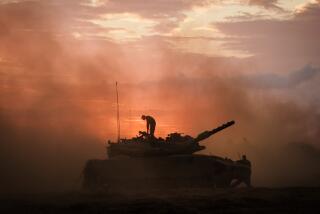Profile : Bush’s Man in Baghdad: Right Mix of Old World Style and Derring Do : ‘I’ve always dreamed of covering a war as a diplomat,’ says Joe Wilson, ‘and now that I’m here in the middle of it; it’s absolutely fascinating.’
- Share via
BAGHDAD, Iraq — Dressed in faded jeans and a Hawaiian shirt, Joe Wilson settled into a deck chair beside his tiny swimming pool in suburban Baghdad the other night, fired up one of the fat cigars that have become his trademark, and reflected on yet another day as the cutting edge of U.S. policy in Iraq.
It was well after midnight, but his dinner of cold pizza and olives remained uneaten on the kitchen counter. Joseph C. Wilson IV, the highest-ranking U.S. diplomat in Iraq and the man President Bush officially designated as “his man” in Baghdad days after the current Persian Gulf crisis began, had been far too busy to eat.
Typically, he had spent hours this day haranguing low-level Iraqi officials about the plight of scores of ailing and aged American hostages, and hours more arranging the nightmarish logistics for a series of freedom flights taking American women and children out of occupied Kuwait city. Then, there were the press briefings, reports to Washington and the basic work of running an embassy that has been America’s only official presence behind enemy lines since the Persian Gulf crisis erupted nearly 10 weeks ago.
When Iraqi President Saddam Hussein said in those early days he was ready to talk to Bush, the U.S. President responded that if Hussein had anything to say, he could say it to Joe Wilson.
But even with such a burden squarely on his shoulders, the 41-year-old career diplomat from an established Northern California family showed few signs of strain as he sat with a Times reporter in the early morning autumn blackness outside his modest, Malibu-style Baghdad residence. Far from it. To hear Joe Wilson tell it, he’s just getting started.
“Are you kidding, or what?” Wilson laughed when asked whether the weeks he has spent commanding the front lines of America’s diplomatic combat with Iraq were finally beginning to take their toll on him.
“No way. For a diplomat, it can’t get any better than this,” he said. “This is it. This is the ultimate test and the ultimate challenge. This is what we’re trained for. This is the major leagues. This is what I spent all those years clinging to the vines of small African countries learning, studying, preparing and waiting for. I’ve always dreamed of covering a war as a diplomat, and now that I’m here in the middle of it; it’s absolutely fascinating.”
If there was a faint strain of immodesty in Wilson’s tone, it was well within context. Disarmingly frank even in the quietest of times, the UC Santa Barbara graduate has carefully crafted an image--both in public and in private--that is finely tuned to personify official U.S. policy toward Saddam Hussein. President Bush is outraged by Hussein’s invasion, annexation, and continuing occupation of Kuwait. So, Wilson’s public pronouncements and daily meetings with Iraqi authorities are steeped in the kind of bluster and angry confidence most likely to convey that pique.
“Joe Wilson has taught the Iraqis a whole new set of four-letter words, as well as some interesting new ways to use them in combination,” noted a European diplomat in Baghdad who has witnessed some of the American’s angrier meetings with Iraqi Foreign Ministry officials.
“It’s sort of a reverse diplomacy,” the European envoy added. “In most situations as a diplomat, you don’t want to offend. But in Joe’s case, here and now in Baghdad, I think he’d actually be a little disappointed if he didn’t. And that’s exactly the role that he should be playing here now. He must make it clear on each and every occasion that America is mad as hell and that it isn’t going to take much more.”
Occasionally, Wilson’s antics have gone beyond words.
At one point last month, for example, when U.S. Secretary of State James A. Baker III engaged in some psychological warfare by publicly turning an innocuous Iraqi diplomatic note into what he inaccurately characterized as an outrageous threat to execute Western diplomats in Baghdad, Wilson read the cue perfectly.
The next morning, the American diplomat showed up at a briefing for Western journalists here with a noose around his neck. The gesture wasn’t meant as “gallows humor,” he stressed, but as a powerful physical statement of America’s utter disdain for the Iraqi regime.
Still, his friends and colleagues in the State Department insist that the role he is playing out here in Iraq is perfectly suited to Wilson, who combines the textbook skills of Old World diplomacy with the looser and more innovative approach that characterizes many members of the department’s new generation of diplomats.
If Wilson had any weaknesses coming into the present crisis, it was his relative lack of experience in the Middle East.
Before arriving in Baghdad from Brazzaville, Congo, 13 months ago, Wilson had spent most of his career as an administrator posted to embassies in former French colonies throughout the African continent. The son of a journalist, he spent several childhood years in Paris. He met his French wife, Jacqueline, on a golf course in Burundi, and, were he not at the eye of the diplomatic storm in Baghdad, Wilson would be taking his scheduled autumn vacation at the couple’s home near the French Riviera town of Hyeres.
Since coming here, however, Wilson has purposely put thoughts of France and Africa aside in order to immerse himself in the complexities of the Arab world.
“I was phenomenally lucky when I arrived here,” Wilson said of his posting as deputy chief of mission to veteran U.S. Ambassador April C. Glaspie a year ago. “As far as I’m concerned, April is the finest Arabist in the State Department, and I had strengths in administration. So, our deal was I’d put together the management of the embassy, and she’d teach me everything she knew about Arab affairs. It’s been like a crash graduate course.”
Not even Wilson knew how valuable that course would be at the time. But, when the invasion of Kuwait was launched on Aug. 2, Wilson clearly needed every bit of knowledge he had been able to absorb--Glaspie had left for her summer vacation a few days before, and Wilson suddenly found himself alone at the top amid the biggest crisis in decades. Since the Bush Administration supposedly wanted to avoid sending the “wrong signal” to Iraq by returning Glaspie to her post after the invasion, her No. 2 has remained No. 1.
Wilson insisted that his crash course in Arab affairs provided enough of a foundation to handle the crisis at hand.
“In terms of being in the Middle East, this is the center of it,” Wilson said of Baghdad. “The Iraqis have a finger in every game in the Middle East, and Iraq’s role has traditionally been both key and pivotal. So, I do think this has been the best possible classroom to prepare for handling this crisis.”
It is, however, an increasingly lonely job.
“This is a great team,” Wilson said repeatedly during the first weeks of the crisis, referring to what was then a nine-person embassy staff and the way they all managed to handle the personal stress of operating in a hostile land.
Then, last month, three of the embassy’s top staff members were declared persona non grata and forced to leave Baghdad in retaliation for a European Community decision to expel all Iraqi military attaches and other diplomatic staff from Europe.
“Sometimes, I think this is the loneliest night of my life,” Wilson said with uncharacteristic sadness that night during another poolside session after escorting his departing colleagues to Saddam International Airport. “Those guys really have been keeping all of us going. And now, we’re just six.”
Even then, however, Wilson’s depression quickly evaporated. Firing up another cigar, the bulky diplomat sat back in his deck chair and started in again on what has become his favorite subject of conversation--Saddam Hussein and the latest moves in what Wilson likes to think of as a prolonged, high-stakes poker game.
“Well, we’ll just keep on plugging away and doing our thing out here,” Wilson concluded on a genuinely gleeful note that dismissed gloomier aspects of the crisis at hand. “And, hell, in the meantime, you’ve got to look at the brighter sides. I mean, it’s not like we’ve been forgotten out here. For one thing, we’ve all been collecting danger pay since the 11th of August, and, hey, that helps pay the mortgage.”
Biography
Name: Joseph Wilson IV
Title: U.S. deputy chief of mission in Baghdad, Iraq. He is the highest-ranking diplomat in Iraq.
Age: 41
Education: Graduate of UC Santa Barbara
Quote: “No one is ever going to be able to point a finger and say Joe Wilson was the guy who lost Iraq.”
More to Read
Sign up for Essential California
The most important California stories and recommendations in your inbox every morning.
You may occasionally receive promotional content from the Los Angeles Times.













